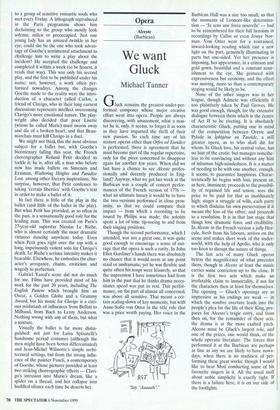Opera
Alceste (Barbican)
We want Gluck
Michael Tanner
Gluck remains the greatest under-per- formed composer whose major creative effort went into opera. People are always discovering, with amazement, what a mas- ter he is, only, it seems, to forget it as soon as they have imparted the thrill of their new passion. So each time any of his mature operas other than Orfeo ed Euridice is performed, there is agreement that he must become part of the regular repertoire, only for the piece concerned to disappear again for another few years. When did we last have a chance to see Alceste profes- sionally and decently produced in Eng- land? Anyway, what we got last week at the Barbican was a couple of concert perfor- mances of the French version of 1776 what an ultimate luxury it would be to have the two versions performed in close prox- imity, so that we could compare their impact — from which a recording to be issued by Philips was made; the soloists spent a lot of time tip-toeing to and from their singing positions.
Though the second performance, which I attended, was not a great one, it was quite good enough to encourage a sense of out- rage that the opera is such a rarity. In John Eliot Gardiner's hands there was absolutely no chance that it would seem at any point staid or undramatic; yet he was flexible and quite often his tempi were leisurely, so that the impression I have sometimes had from him in the past that he thinks drama neces- sitates speed was put to rest. This perfor- mance, on the part of almost all concerned, was above all sensitive. That meant a cer- tain scaling-down of key moments, but with Anne-Sofie von Otter in the title role that was a price worth paying. Her voice in the 'Say "Aaaaah".' Barbican Hall was a size too small, so that the moments of Leonore-like determina- tion — sens une force nouvelle' — had to be remembered for their full heroism in recordings by Callas or even Jessye Nor- man. Von Otter went for a restrained, inward-looking reading which cast a new light on the part, genuinely illuminating in parts but one-sided. Yet her presence is imposing, her appearance, in a crimson and gold gown, beautiful and a constant nour- ishment to the eye. She gestured with expressiveness but economy, and the effect was moving, more so than a contemporary staging would be likely to be.
None of the other singers was in her league, though Admete was efficiently if too plaintively taken by Paul Groves. He was good enough, though, for the extensive dialogue between them which is the centre of Act II to be riveting. It is absolutely characteristic Gluck, putting one in mind of the competition between Oreste and Pylade in Iphigenie en Tawide, a still greater opera, as to who shall die for whom. In Gluck love, his central value, has no hint of the erotic, but manages nonethe- less to be convincing and without any hint of inhuman high-mindedness. It is a matter of needing to be with one another, enough, it seems, to guarantee happiness. Charac- teristically he begins with loss, present or, as here, imminent; proceeds to the possibil- ity of regained life and union; sees the price to be paid for that as inordinately high; stages a struggle of wills, each party to which disdains his own preservation if it means the loss of the other; and proceeds to a resolution. It is in that last stage that things lose dramatic force and credibility. In Alceste in the French version a jolly Her- cule, fresh from his labours, arrives on the scene and makes short work of the under- world, with the help of Apollo, who is only too keen to disrupt the nature of things.
The last acts of many Gluck operas betray the magnificence of what precedes them, though in Alceste at least the music carries some conviction up to the close. It is the first two acts which make an irrefutable claim to immortality, if not for the characters then at least for themselves. The opening — Gluck's openings are as impressive as his endings are weak — in which the sombre overture leads into the people's plea for the life of their King, pre- pares for Alceste's tragic entry, and from then on, for the remainder of these acts, the drama is at the most exalted pitch. Alceste must be Gluck's largest role, and one of the prizes, one would think, of the whole operatic literature. The forces that performed it at the Barbican are perhaps as fine as any we are likely to have nowa- days, when there is no tradition of per- forming these great works; though I would like to hear Muti conducting some of his favourite singers in it. All the usual stuff about noble simplicity is exactly right. If there is a failure here, it is on our side of the footlights.


























































































 Previous page
Previous page